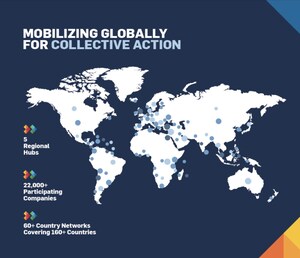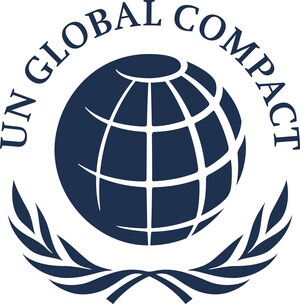UN Global Compact, African Union and Partners Convene 4th African Business and Human Rights Forum to Advance Remedy, Reparations and Responsible Business in Africa
LUSAKA, Zambia, Oct. 9, 2025 /PRNewswire/ -- The 4th African Business and Human Rights Forum (ABRH) concluded today in Lusaka, Zambia, bringing together more than 600 participants, including business leaders, governments, civil society, Indigenous Peoples, national human rights institutions and international partners, to advance the implementation of the United Nations Guiding Principles on Business and Human Rights (UNGPs) across Africa.
The Forum, held from 7 to 9 October under the theme "From Commitment to Action: Advancing Remedy, Reparations and Responsible Business Conduct in Africa," was co-organized by several partners, including the African Union, the UN Global Compact, UNDP, the UN Working Group on Business and Human Rights, UN Human Rights (OHCHR), the African Commission on Human and Peoples' Rights (ACHPR) and UNICEF.
This year's Forum aligned with the African Union theme, "Justice for Africans and People of African Descent Through Reparations." Participants focused on concrete steps to strengthen remedy and reparations frameworks and to promote responsible business conduct in the context of Africa's evolving economic and regulatory landscape. The Forum has become a critical platform for moving from policy to practice, accelerating implementation, and highlighting regional solutions to ensure that businesses in Africa uphold human rights while contributing to inclusive and sustainable development.
Over three days, the Forum featured high-level panels, roundtables and clinics, alongside a dedicated UN Global Compact Networking Event. These sessions provided space for governments, businesses and rights holders to exchange experiences, showcase innovations and build partnerships to translate high-level commitments into tangible action.
Discussions centred on four priority areas:
- Strengthening access to remedy for victims of business-related human rights and environmental harms through improved policy frameworks, stronger judicial capacity and more effective grievance mechanisms;
- Advancing reparations by emphasizing the shared responsibility of states and businesses to address historical and ongoing injustices;
- Promoting responsible business conduct by embedding human rights due diligence across operations and aligning with regional frameworks such as the African Continental Free Trade Area (AfCFTA) and the draft AU Business and Human Rights Policy; and
- Enhancing transparency and accountability through digital tools, improved reporting and collective monitoring of commitments.
Speaking at the opening of the Forum, Hervé Lado, Africa Head of the UN Global Compact, underscored the urgent need for businesses to embed human rights into their operations and lead by example. "The theme of this year is a call to action for effective remedy, an invitation to go beyond protect and respect. As we develop our new global strategy 2026-2030, we want to equip more businesses in Africa by 2030 with knowledge, expertise and more ambition in upholding the Ten Principles and implementing adequate and effective remedies where their activities have caused adverse impacts. How companies respect human rights and implement remedies is central to building resilient and inclusive economies," Lado said.
Issaka Garba Abdou, Head of Division for Governance and Human Rights, Department of Political Affairs, Peace and Security at the African Union Commission, speaking at the Forum, emphasized the importance of Africa-driven approaches to business and human rights. "Our human rights approach derives from the AU Charter of 1981, and we promote a business and human rights approach that is rooted in African cultures and realities, with homegrown solutions. An African Guidance on Business and Human Rights has been drafted by the AU Commission and is currently under review," Abdou said.
The Lusaka Forum builds on earlier editions hosted in Ghana, Ethiopia and Kenya, and included a one year review on progress of the Nairobi Declaration 2024, which laid the foundation for advancing business and human rights across the continent.
Responsible business conduct in Africa continues to gain momentum, anchored in global and regional frameworks such as the United Nations Guiding Principles on Business and Human Rights(UNGPs), the African Union (AU) Constitutive Act, Agenda 2063, the AU Strategic Action Plan for the Promotion and Protection of Human and Peoples' Rights in Africa, the draft AU BHR Policy and the African Commission on Human and Peoples' Rights Resolution on Business and Human Rights in Africa.
About the UN Global Compact
The ambition of the UN Global Compact is to accelerate and scale the global collective impact of business by upholding the Ten Principles and delivering the SDGs through accountable companies and ecosystems that enable change. With more than 20,000 participating companies, 5 Regional Hubs, 65 Country Networks covering 85 countries and 9 Country Managers establishing Networks in 16 other countries, the UN Global Compact is the world's largest corporate sustainability initiative — one Global Compact uniting business for a better world. For more information, follow @globalcompact on social media and visit our website at unglobalcompact.org.
Logo - https://mma.prnewswire.com/media/2597908/UNGC_Logo.jpg





Share this article